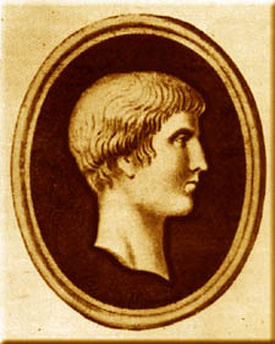
Authority Cited: Martial
Author name and dates: Marcus Valerius Martialis (40-102 to 104)
BKG Bio-tweet: Latin poet from Hispania; flattered Rome patrons; satirist; creator of modern epigram; wrote 1500: descriptive to pungent
Categories (list of works cited – preliminary) [BKG Note: two Martial cites were identified in 1775 Dict. vol. 1, one Martial cite in 1755 Dict. vol. 2. No Martial cites were identified as added in the 1773 Dict. The SJ source for the Martial epigram quotes is unknown. Martial is also cited in quotes of other authors such as B. Jonson, Dryden, and Addison.]
The entire epigram in Loeb is:
99 Bascauda
Barbara de pictis veni bascauda Britannis,
sed me iam mavult dicere Roma suam.
The English translation from Loeb is:
99. Basket
I have come, a barbarian basket, from the painted Britons,
but Rome now prefers to call me hers.
Martial Epigrams 100, Book 1, LCL 94, pp. 112-113, Loeb Classical Library, edited and translated by D.R. Shackleton Bailey; dad/daddy
In the etymology and definition for DAD/ DADDY SJ writes "The child's way of expressing father. It is remarkable, that, in all parts of the world, the word for father, as first taught to children, is compounded of a and t, or the kindred letter d differently placed; as tad, Welsh; Greekassa, Greek; atta, Gothick; tata, Latin. Mammas atque tatas habet Afra, Mart.] Father." [BKG Note: the Martial cite is not in the 1773 Dict.]
The Epigram in Loeb is:
100.
Mammas atque tatas habet Afra, sed ipsa tatarum
dici et mammarum maxima mamma potest.
The English translation from Loeb is:
100.
Afra has mamas and dadas, but she herself may be called the
grandmama of dadas and mamas.
Martial Epigrams 71, Book 13, LCL 480, pp. 200-201, Loeb Classical Library, edited and translated by D.R. Shackleton Bailey; phenicopter
In the definition of phenicopter, SJ gives:
"A kind of bird, which is thus described by Martial:
Dat mihi penna rubens nomen sed lingua gulosis
Nostra sapit; quid si garrula lingua foret?"
The Epigram in Loeb is:
71 Phoenicopteri
Dat mihi pinna rubens nomen, sed lingua gulosis
nostra sapit. quid si garrula lingua foret?
The English translation from Loeb is:
71. Flamingoes
My ruddy wing gives me a name, but my tongue is a treat to
epicures. What if my tongue were to tell tales?
Author name and dates: Marcus Valerius Martialis (40-102 to 104)
BKG Bio-tweet: Latin poet from Hispania; flattered Rome patrons; satirist; creator of modern epigram; wrote 1500: descriptive to pungent
Categories (list of works cited – preliminary) [BKG Note: two Martial cites were identified in 1775 Dict. vol. 1, one Martial cite in 1755 Dict. vol. 2. No Martial cites were identified as added in the 1773 Dict. The SJ source for the Martial epigram quotes is unknown. Martial is also cited in quotes of other authors such as B. Jonson, Dryden, and Addison.]
- Martial Epigrams 99, Book 14, LCL 480, pp. 272-273, Loeb Classical Library, edited and translated by D.R. Shackleton Bailey; basket
The entire epigram in Loeb is:
99 Bascauda
Barbara de pictis veni bascauda Britannis,
sed me iam mavult dicere Roma suam.
The English translation from Loeb is:
99. Basket
I have come, a barbarian basket, from the painted Britons,
but Rome now prefers to call me hers.
Martial Epigrams 100, Book 1, LCL 94, pp. 112-113, Loeb Classical Library, edited and translated by D.R. Shackleton Bailey; dad/daddy
In the etymology and definition for DAD/ DADDY SJ writes "The child's way of expressing father. It is remarkable, that, in all parts of the world, the word for father, as first taught to children, is compounded of a and t, or the kindred letter d differently placed; as tad, Welsh; Greekassa, Greek; atta, Gothick; tata, Latin. Mammas atque tatas habet Afra, Mart.] Father." [BKG Note: the Martial cite is not in the 1773 Dict.]
The Epigram in Loeb is:
100.
Mammas atque tatas habet Afra, sed ipsa tatarum
dici et mammarum maxima mamma potest.
The English translation from Loeb is:
100.
Afra has mamas and dadas, but she herself may be called the
grandmama of dadas and mamas.
Martial Epigrams 71, Book 13, LCL 480, pp. 200-201, Loeb Classical Library, edited and translated by D.R. Shackleton Bailey; phenicopter
In the definition of phenicopter, SJ gives:
"A kind of bird, which is thus described by Martial:
Dat mihi penna rubens nomen sed lingua gulosis
Nostra sapit; quid si garrula lingua foret?"
The Epigram in Loeb is:
71 Phoenicopteri
Dat mihi pinna rubens nomen, sed lingua gulosis
nostra sapit. quid si garrula lingua foret?
The English translation from Loeb is:
71. Flamingoes
My ruddy wing gives me a name, but my tongue is a treat to
epicures. What if my tongue were to tell tales?